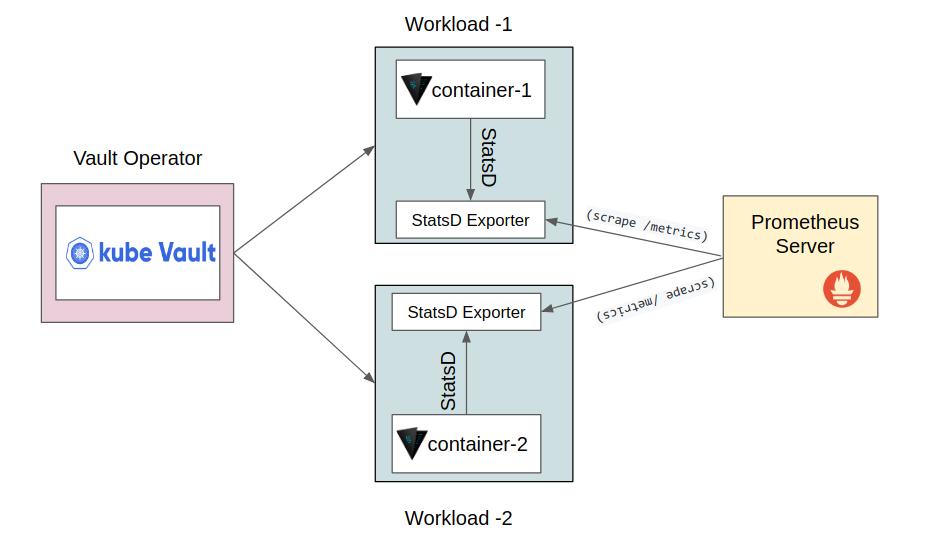New to KubeVault? Please start here.
Monitoring Vault Server
Vault operator has native support for monitoring via Prometheus. You can use builtin Prometheus scrapper or CoreOS Prometheus Operator to monitor Vault operator. This tutorial will show you how this monitoring works with Vault operator and how to enable them.
Overview
By default the Vault operator will configure each vault pod to publish statsd metrics. The Vault operator runs a statsd-exporter container as sidecar to convert and expose those metrics in the format for Prometheus. Following diagram shows the logical structure of Vault operator monitoring flow.

Each pod provides metrics at /metrics endpoint on port 9102
Operator Metrics
Following metrics are available for Vault server. These metrics are accessible through api endpoint of vault-operator service.
- vault_audit
- vault_audit_file
- vault_barrier
- vault_core
- vault_runtime
- vault_expire
- vault_merkle_flushdirty
- vault_merkle_savecheckpoint
- vault_policy
- vault_token
- vault_wal
- vault_rollback_attempt
- logshipper_streamWALs
- replication
- database
- database_error
- database_name
- database_named_error
- vault_storage_backend
- vault_provider_lock
- vault_consul
- vault_route
- vault_expire_num_leases
- vault_runtime_alloc_bytes
- vault_runtime_free_count
- vault_runtime_heap_objects
- vault_runtime_malloc_count
- vault_runtime_num_goroutines
- vault_runtime_sys_bytes
- vault_runtime_total_gc_pause_ns
- vault_runtime_total_gc_runs
- vault_runtime_gc_pause_ns
How to Enable Monitoring
You can enable monitoring through some flags while installing or upgrading or updating. Vault operator via both script and Helm. You can chose which monitoring agent to use for monitoring. Vault operator will configure respective resources accordingly. Here, are the list of available flags and their uses,
| Script Flag | Helm Values | Acceptable Values | Default | Uses |
|---|---|---|---|---|
--monitoring-agent |
monitoring.agent |
prometheus.io/builtin or prometheus.io/coreos-operator |
none |
Specify which monitoring agent to use for monitoring Vault operator. |
--monitor-operator |
monitoring.operator |
true or false |
false |
Specify whether to monitor Vault operator. |
--prometheus-namespace |
monitoring.prometheus.namespace |
any namespace | same namespace as Vault operator | Specify the namespace where Prometheus server is running or will be deployed |
--servicemonitor-label |
monitoring.serviceMonitor.labels |
any label | For Helm installation, app: <generated app name> and release: <release name>. For script installation, app: vault-operator |
Specify the labels for ServiceMonitor. Prometheus crd will select ServiceMonitor using these labels. Only usable when monitoring agent is prometheus.io/coreos-operator. |
You have to provides these flags while installing or upgrading or updating Vault operator. Here, are examples for both script and Helm installation process are given which enable monitoring with prometheus.io/coreos-operator Prometheuse server for operator metrics.
Helm:
$ helm install appscode/vault-operator --name vault-operator --version 0.2.0 --namespace kube-system \
--set monitoring.agent=prometheus.io/coreos-operator \
--set monitoring.operator=true \
--set monitoring.prometheus.namespace=demo \
--set monitoring.serviceMonitor.labels.k8s-app=prometheus
Script:
$ curl -fsSL https://raw.githubusercontent.com/kubevault/operator/0.2.0/hack/deploy/install.sh | bash -s -- \
--monitoring-agent=prometheus.io/coreos-operator \
--monitor-operator=true \
--prometheus-namespace=demo \
--servicemonitor-label=k8s-app=prometheus